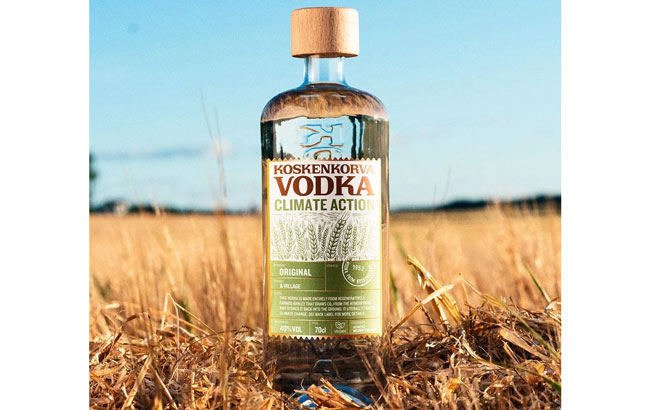The big interview: Kirsi Puntila, Anora Group
By Melita KielyKirsi Puntila, the new CEO of Anora Group, is confident she can drive the company towards its ambitious goals with its strong Nordic brands.

*This feature was originally published in the June 2025 issue of The Spirits Business magazine.
“I love the people – and I love, love the brands – and I love the ‘spirit’ of spirits,” gushes Kirsi Puntila, who was appointed CEO of Anora Group in March this year. “This industry is full of fun, loving, entrepreneurial, inspirational, and yet professional and knowledgeable people.” She says she “tried to escape once”, but after a stint working in consultancy, Puntila realised the spirits industry was her professional calling.
After a decade at French conglomerate Pernod Ricard, Puntila felt ready for a new challenge. “My 10-year anniversary approached, and I’d had my first child, and I thought, ‘OK, what’s next?’ I felt like after 10 years in this company I needed to look outside – because I loved Pernod Ricard, I still have great respect for the brands and people. But I felt like, OK, do I want to be a small fish in a big pond, or a big fish in a smaller pond?”
Puntila joined Altia in 2014, which went on to merge with Arcus in 2021 to form Anora Group. “Anora has the beauty of being big enough to have enough resources to create innovations, invest in brands, and have proper functions, yet we are small enough to have the agility, speed, and very short decision-making span,” Puntila notes. “When I was making my decision, my then boss said to me, ‘OK, if you want to make a change, call me. That takes you two minutes. Then I’ll go to call the CEO. That’s five minutes. So, within seven minutes, you’ll have your decision.’ That was quite a good speech for me because I wanted to get my hands dirty and really make decisions.”
While Puntila says she never set out to specifically work in spirits, she did have a desire to “work with strong Nordic brands”. Safe to say, mission accomplished. Anora Group’s spirits portfolio includes Finnish vodka Koskenkorva, and leading aquavit brands Linie and OP Anderson.
On the aquavits, Puntila has been heartened to see newer brands come to market, welcoming the “dynamism and competition” they bring to the category.
“But I would be lying if I didn’t say that it’s a difficult category,” she admits. “But having said that, we have such a beautiful range of legacy brands with amazing heritage and strong provenance from different Scandinavian countries. There are pockets of opportunities.”
Anora recently released a new expression of OP Anderson, called Amp – “which is basically aquavit amplified” – and has been designed as a spicy, aquavit shot, created for high-energy occasions. “We want to rejuvenate the aquavit category, and hope that we get more competition to help us do that as well.”
But like many spirits firms, 2024 proved to be a challenging year to grow sales for Anora Group. Overall net sales for the group fell by 4.7% in 2024, as its spirits segment dropped by 4.2% to €227 million (US$235.6m).
The first three months of 2025 also took a tumble for Anora Group, as net sales dropped by 3.8% compared with last year’s first quarter. For spirits specifically – as Anora also makes wine – this was partially explained by the later Easter date, which fell on Sunday 20 April. The company’s outlook for the remainder of 2025 forecasts that overall, volume sales in the group’s key markets will be relatively flat compared with 2024. However, slight value increases are expected.
All of this precedes Puntila’s appointment at the helm of Anora Group. But she explains: “The brief from the board to me has been quite clear, and that is to turn around the company. So that is the short-term goal.

“Looking at the mid-term priorities, first and foremost we need to, and want to, improve the profitability of our beverage business in particular through active mix and revenue management, as well as continuous cost management, which we’re doing really well. Second, we want to strengthen our cash position and balance sheet. We need to reduce our working capital and improve our inventory turnover. The third mid-term priority for me is to not only squeeze and cut, but also restore organic net sales growth – which has been challenging for us lately for both wines and spirits – by focusing on our current portfolio with the largest categories, brands and partnerships.”
In the long-term, Puntila says the current 2030 strategy “is still valid”. This will entail Anora Group continuing to be the “wine and spirits powerhouse in our Nordic markets, Finland, Sweden and Norway”. Furthermore, the company hopes to scale up in adjacent markets, such as Denmark and the Baltics. The latter will be aided by Anora Lithuania, a dedicated commercial branch to grow the group’s position in the Baltics, which was established in the second quarter of this year. “We want to cement our position in the
Pan-Nordic-Baltic region, then finally accelerate beyond the Nordics, which first and foremost means international expansion with our strongest sustainable hero, Koskenkorva,” Puntila says.
Mergers and acquisitions
Anora Group has lightened its portfolio in the past two years to support its long-term vision. In 2023, it sold Larsen Cognac to ThaiBev’s International Beverage division for €54.1m (US$61.3m). The sale included Larsen’s production site and maturing eaux-de-vie in France, plus Cognac brands Larsen, Renault, and Monopol, plus Ibis Brandy.
Meanwhile, in 2024, Anora completed the sale of Swedish schnapps brand Snälleröds to Malmö-based beverage company Saturnus.
Asked if Anora Group plans to engage in any future acquisitions, Puntila responds: “Oh, absolutely we do. We have communicated all along that we are carefully observing the market and investigating different avenues of growth. However, M&A does require investments and organisation readiness to be successful.
“It’s fair to say that it has taken a bit longer than expected to get our original integration finalised, i.e. the merger of Arcus and Altia. We need to make sure we improve our balance sheets and meet our short-term goals; then we will be in a position to think about major acquisitions. We have a shortlist of candidates but we’re being a bit moderate on that right now because my ambition is to first work on the profitability and ensure that foundation is strong. Only when we have certain other limits in place will we be able to accelerate on that front.”

Changes to alcohol laws in its home market of Finland in 2024 created a new challenge for Anora Group in the region – but on the wine side of the business, at least, the company has been able to quickly respond to and capitalise on the legislative changes with new product development.
In June last year, the Finnish government increased the ABV limit of fermented alcoholic beverages for sale in licensed retailers from 5.5% ABV to 8% ABV. While that is good news for wine, beer and cider, this clearly does not include distilled spirits, which remain limited to sales via the government-controlled monopoly store Alko, or licensed bars and restaurants.
Many people have spoken out about this injustice against spirits, with trade body Spirits Europe arguing “the bill unjustifiably discriminates against comparable alcoholic beverages based on their respective method of production to the disadvantage of those with a distilled alcohol base”.
“It’s a nightmare,” says Puntila. “We were super quick to create 8% [ABV] wines by ourselves and with our partners – so that’s the good side of it. We took 50% of market share of all the grocery 8% wines with our wine. That’s a good thing. But then, obviously, there’s the other side of the coin, which is that simultaneously the foot traffic for alcohol has dramatically declined, which has a significant impact on our spirits sales.”
Legislative changes
According to nordicalcohol.org, Alko’s sales volume decreased by around 10% last year due to the legislative changes. Luckily, “Anora has the beauty of being the biggest player in the market in terms of wines and spirits. So, we will adjust,” says Puntila with optimism.
And she is so full of optimism about the potential of Anora Group. “I remain positive because Anora has a very strong foothold in the Nordics, and not only the Nordics anymore, but in the Baltics as well. We are the number-one player in this region. And there’s a whole new generation of young international people in the organisation who just inject so much energy into this company. The future is really exciting and bright for Anora.”
Anora Group has long been committed to sustainable practices. In March, Anora invested in a biomass boiler for its Koskenkorva Distillery in Ilmajoki, Finland. Scheduled for commissioning in 2026, the biomass boiler will run entirely on renewable energy – by the end of 2026, Koskenkorva Distillery will be a carbon-neutral facility. “This is a very important goal that we have stated in our sustainability roadmap,” Puntila adds. “Koskenkorva Distillery is the main source of our scope one and two emissions, so it is a very important step in reducing the environmental impact of our operations.”

Anora’s commitment to sustainability has also aided its success in monopoly markets, as the tenders are increasingly seeking sustainable options. “You get a better ranking the more sustainable options you can offer [to monopolies],” Puntila explains. “I would almost say that one of the reasons they woke up was that we were pushing for sustainability. We are on this journey together, and we have close relationships in all the three monopoly markets [Finland, Sweden and Norway]. We’re very happy to see that they’re also pushing for that sustainability agenda.”
With a recently appointed vice-president of spirits at Anora – a role Puntila had been jointly overseeing – the CEO has further confidence the group is set to reach its targets. Imre Avalo took the position in May, after starting at Altia in 2017.
“First and foremost, I’m so happy that I can stop double-hatting,” quips Puntila. “I’ve worked with Imre for several years already and I’m so happy we were able to get Imre on board. I’m convinced that with Imre’s energy, his dedication and business acumen he will hugely benefit the rest of the spirits team. I think what he will bring to us is a more open-market mentality. He will shake up the ways of working and the monopoly markets.”
There’s no questioning the fast pace of the spirits industry. But the unpredictability is part of what excites Puntila about her position. “I love when there’s a lot of action going on, I think it’s super exciting,” she says. “I’ve been doing this for over 20 years now and I’ve heard so many say, ‘OK, now there’s a big change coming, the consumer behaviour is changing.’ But now, it actually is changing. You see the younger generations and how their consumption habits are quite different from maybe two or three generations before them. Then the phenomenon of sustainability, low- and no-alcohol – completely new categories and consumption habits. The ones who are alert and who are reacting to the silent signals quickest will win.”
Related news
Anora continues regenerative farming initiative
